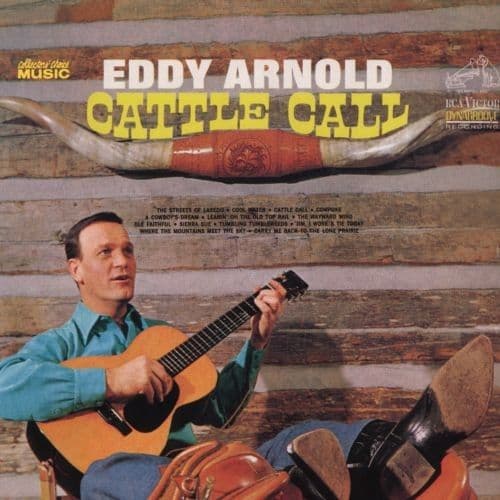
The Boundless Horizon of Freedom and Escape
Let’s drift back to an era when country music was still deeply rooted in tales of wide-open spaces, honest work, and the yearning heart. In this landscape, the voice of Eddy Arnold stood as a towering presence, a smooth baritone that could convey profound emotion with effortless grace. Known as the “Tennessee Plowboy,” Arnold was a master at blending traditional country sounds with a sophisticated pop sensibility, making him a true crossover sensation. Today, we invite you to close your eyes and imagine the vast expanse of the American West as we revisit one of his evocative, lesser-known gems: “Where the Mountains Meet the Sky.”
“Where the Mountains Meet the Sky” was released by Eddy Arnold in 1963, a period when his career was firmly cemented as one of country music’s all-time greats. This particular track was featured on his album “Cattle Call,” an album that paid homage to classic Western standards and cowboy songs. While “Cattle Call” itself was a significant album for Arnold, becoming his first to make the Billboard album charts, “Where the Mountains Meet the Sky” was not released as a standalone single and therefore did not chart independently. However, its inclusion on such a thematically cohesive and popular album for a legendary artist like Arnold ensured it reached a wide audience and remained a cherished part of his extensive catalog. The album’s focus on cowboy themes resonated deeply with fans of traditional country and Western music, providing a refreshing counterpoint to some of the more pop-oriented sounds emerging at the time.
The story behind “Where the Mountains Meet the Sky” lies in the songwriting collaboration of Aston “Deacon” Williams and S. Keye. These talented writers crafted a lyrical landscape that perfectly matched the sweeping, romantic imagery often associated with the American frontier. While the specific inspiration for the song might not be widely documented, it clearly draws from the archetypal longing for escape, adventure, and the freedom found in nature’s grandeur. For Eddy Arnold, a man who had grown up in rural Tennessee and understood the pull of the land, the song’s themes resonated deeply. His smooth, relaxed vocal style was perfectly suited to convey the sense of tranquil yearning and the quiet determination to seek a better life. The production, likely overseen by the legendary Chet Atkins, would have ensured a polished yet authentic sound, allowing Arnold’s voice to be the focal point amidst gentle, supportive instrumentation that evoked open spaces.
The meaning of “Where the Mountains Meet the Sky” is a lyrical yearning for a place of ultimate freedom, peace, and perhaps, a new beginning. It speaks to the universal human desire to leave behind the struggles and complexities of the familiar for a pristine, almost utopian existence. The singer envisions a journey to a distant, idealized land where “hardship don’t prevail,” a place where the “blue horizon” offers boundless possibilities. It’s an escape, not born of cowardice, but of a profound spiritual and emotional need for tranquility and unburdened existence. Phrases like “I’m gonna ride, ride, ride / Ride down that dusty trail / To the land of sweet enchantment” paint a vivid picture of a deliberate, hopeful pursuit of this dream. For older listeners, this song taps into that enduring human fantasy of finding a place of ultimate peace, a sanctuary from life’s demands. It evokes memories of simpler aspirations, of dreaming of a fresh start, a retreat to a place where worries melt away.
Listening to “Where the Mountains Meet the Sky” by Eddy Arnold today is a gentle journey back in time. His voice, warm and reassuring, guides you through the imagined landscape. The instrumentation is classic country-pop: perhaps a lilting steel guitar, a steady rhythm section, and the subtle swell of strings, all designed to create an atmosphere of peaceful contemplation. It lacks the dramatic flair of some of his bigger hits, opting instead for a quiet, reflective charm. It reminds us of the power of music to transport us, to evoke not just places, but profound emotional states – in this case, the timeless human yearning for a boundless horizon where true freedom awaits. It’s a comforting, almost meditative piece that showcases Arnold’s unique ability to find beauty and solace in the vast, hopeful expanse of imagination.